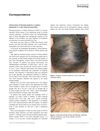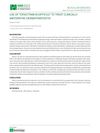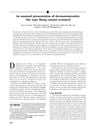 January 2011 in “International Journal of Trichology”
January 2011 in “International Journal of Trichology” The conference highlighted new diagnostic tools, the role of genetics in hair loss, and emerging treatments.
 September 1997 in “Journal of the European Academy of Dermatology and Venereology”
September 1997 in “Journal of the European Academy of Dermatology and Venereology” People with acne have more CD4+ immune cells in their skin than healthy people.
 September 2022 in “Hair transplant forum international”
September 2022 in “Hair transplant forum international” JAK inhibitors like baricitinib are a new FDA-approved treatment for alopecia areata, but safety data is incomplete.
 October 2022 in “Portuguese journal of dermatology and venereology”
October 2022 in “Portuguese journal of dermatology and venereology” Dupilumab led to complete hair regrowth and improved skin condition in a young man with severe eczema and hair loss.
Proper nutrition and vitamins can boost the immune system and overall health in older adults.
 1 citations,
July 2022 in “The journal of investigative dermatology/Journal of investigative dermatology”
1 citations,
July 2022 in “The journal of investigative dermatology/Journal of investigative dermatology” Tofacitinib helps improve skin conditions in people with Down syndrome, especially alopecia areata.
 April 2023 in “Journal of Investigative Dermatology”
April 2023 in “Journal of Investigative Dermatology” Higher PD-1 levels are linked to fewer immune cells in hair follicles in alopecia areata.
2 citations,
December 2017 in “The journal of investigative dermatology. Symposium proceedings/The Journal of investigative dermatology symposium proceedings” The conclusion is that a new method could improve the identification of autoimmune targets in alopecia areata, despite some limitations.
October 2021 in “Book Publisher International (a part of SCIENCEDOMAIN International)” The combination therapy of microdermabrasion and steroid injections is more effective for treating scalp Alopecia Areata than steroid injections alone.
 2 citations,
April 2019 in “Acta medica Philippina/Acta Medica Philippina”
2 citations,
April 2019 in “Acta medica Philippina/Acta Medica Philippina” People with alopecia areata often have lower vitamin D levels than healthy people.
 July 2023 in “British journal of dermatology/British journal of dermatology, Supplement”
July 2023 in “British journal of dermatology/British journal of dermatology, Supplement” Skin tumors with CYLD cutaneous syndrome show more NF-κB activity and less organized collagen.
1 citations,
January 2022 in “Clinical Cases in Dermatology” A rare scalp condition was successfully treated with specific medications after 9 months.
 4 citations,
January 2016 in “Dermatology practical & conceptual”
4 citations,
January 2016 in “Dermatology practical & conceptual” A man developed a rare skin condition after a hair transplant surgery.
 13 citations,
January 2018 in “International Journal of Dermatology”
13 citations,
January 2018 in “International Journal of Dermatology” The study found that treatment improved hair condition in patients with Fibrosing Alopecia in a Pattern Distribution in Chile.
 January 2019 in “Przegląd Dermatologiczny”
January 2019 in “Przegląd Dermatologiczny” An 87-year-old woman was diagnosed with type 3 autoimmune polyendocrine syndrome and had multiple autoimmune issues.
6 citations,
September 2011 in “Journal of the American Academy of Dermatology” A man with HIV had an unusual syphilis rash that looked like folliculitis but was cured with penicillin.
 September 2022 in “XXXIX Congresso Brasileiro de Reumatologia”
September 2022 in “XXXIX Congresso Brasileiro de Reumatologia” Tofacitinib may effectively treat skin symptoms in difficult cases of dermatomyositis.
 April 2023 in “Tikrit journal of pharmaceutical sciences”
April 2023 in “Tikrit journal of pharmaceutical sciences” Ginger extract helps hair growth and reduces the need for prednisolone in alopecia areata patients.
11 citations,
January 2018 in “Jaypee's international journal of clinical pediatric dentistry” Papillon-Lefèvre Syndrome causes early tooth loss and skin issues, needing early dental diagnosis.
 December 2023 in “EPRA international journal of multidisciplinary research”
December 2023 in “EPRA international journal of multidisciplinary research” Alopecia areata causes sudden hair loss, has genetic links, and can be managed but not cured.
June 2023 in “Clinical Cosmetic and Investigational Dermatology” The new technique effectively treats hairline vitiligo with repigmentation and hair regrowth.
 10 citations,
January 2013 in “Clinical and developmental immunology/Clinical & developmental immunology”
10 citations,
January 2013 in “Clinical and developmental immunology/Clinical & developmental immunology” The document concludes that systemic autoimmune diseases are complex, incurable, and require ongoing treatment and research.
9 citations,
January 2019 in “International Journal of Trichology” Combining calcipotriol with mometasone is more effective for treating alopecia areata than using mometasone alone.
 115 citations,
September 2000 in “The Lancet”
115 citations,
September 2000 in “The Lancet” Early hair loss may indicate risk of insulin resistance.

People with chronic hives should be tested for thyroid autoimmunity to manage their condition better.
 June 2010 in “Expert Review of Dermatology”
June 2010 in “Expert Review of Dermatology” Scientists found key proteins and genes that affect skin and hair health, and identified potential new treatments for hair loss, skin disorders, and wound healing.
 2 citations,
March 2020 in “PubMed”
2 citations,
March 2020 in “PubMed” Biotin deficiency is not a major cause of Telogen Effluvium hair loss.
 36 citations,
November 2000 in “Journal of the American Academy of Dermatology”
36 citations,
November 2000 in “Journal of the American Academy of Dermatology” A woman with dermatomyositis showed rare skin symptoms, was treated successfully, and her case suggests checking for cancer in similar patients.
 9 citations,
November 2000 in “Journal of the American Academy of Dermatology”
9 citations,
November 2000 in “Journal of the American Academy of Dermatology” A woman with a rare type of dermatomyositis improved with low-dose prednisone and methotrexate.
 September 2022 in “The American journal of dermatopathology/American journal of dermatopathology”
September 2022 in “The American journal of dermatopathology/American journal of dermatopathology” Sunscreen particles were not found in inflamed or fibrotic areas of skin in FFA patients, suggesting no direct link to the disease.






















